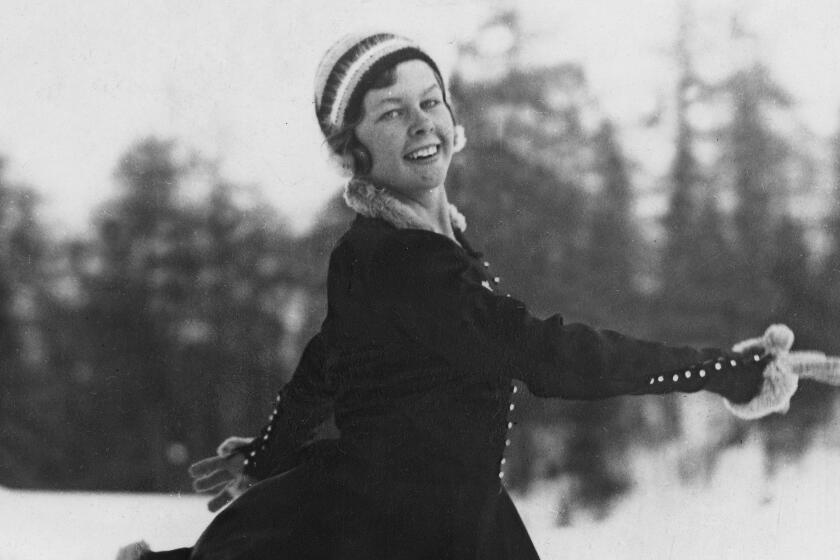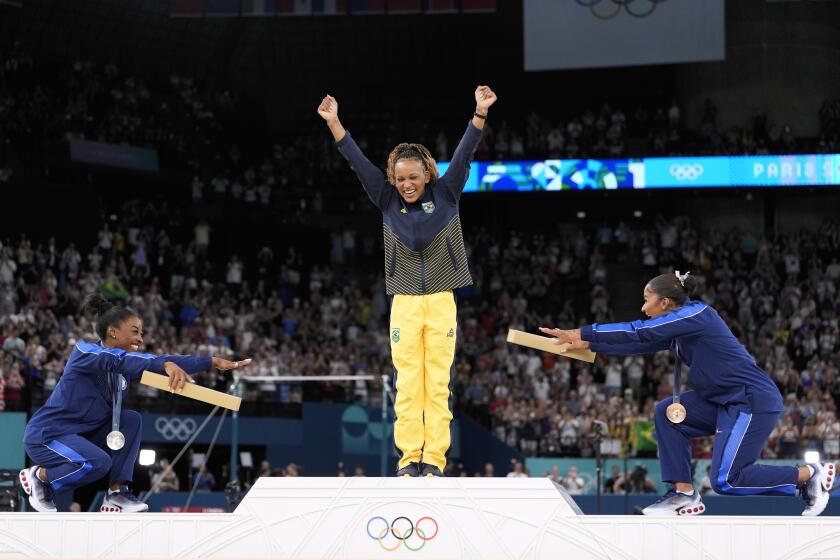Well-lived life is compulsory for Hamilton
“I am a short, bald, chemo’d, brain-radiated, surgically repaired, male figure skater of unknown ethnic origin. What choice do I have but to be optimistic?”
Anyone fortunate enough to know Scott Hamilton will recognize his blunt humor in that passage from his soon-to-be-released book, “The Great Eight: How to Be Happy (Even When You Have Every Reason to Be Miserable).”
If you don’t know Hamilton, the 1984 Olympic figure skating gold medalist, survivor of testicular cancer and a brain tumor, you will think of him as a friend after reading this book.
Due Jan. 6, it’s part self-help guide and part life manual with fatherly advice and reminders to seek joy amid everyday annoyances. It’s not a rehash of his autobiography, published in 2000.
“To do another book was not really in my plans,” he said.
Nor did he plan to get testicular cancer in 1997 or a pituitary brain tumor in 2004.
After that last medical ordeal -- his third, starting with the childhood digestive disorder that stunted his growth -- Hamilton began speaking to fellow brain tumor patients about the faith and philosophy that sustained him. From that came the book he felt compelled to write.
“You always joke about the old cliche, what doesn’t kill you makes you stronger -- or leaves you disfigured for the rest of your life,” Hamilton said. “I look at the scars I’ve accumulated, and that skin is tougher than what was there before.
“I’ve got a familiar face. There’s more of it now than ever before. I felt I’ve experienced things for a reason and I’ve been able to help people going through cancer just by talking them through it. I’ve been through enough that it’s brought me to a place that a decision here, a decision there, perspective, and kind of a shift in my mentality, wow, what a difference. And I just thought if I can share that with people it might inspire them to do the same.”
He structured the book in eight chapters to celebrate his affinity for the number eight.
Born on 8/8/58 (and adopted six weeks later), he spent thousands of hours tracing variations of the basic figure eight while practicing compulsory figures. They demanded precision and patience but promoted edge control and body awareness, nuances lost on kids who wanted to jump and spin.
Compulsories weren’t TV-friendly and were eliminated by skating officials. Hamilton lamented the decision.
“I knew what they gave to me. Ultimately they gave me better control over what I was doing on the ice, and I wouldn’t have won the Olympics without them,” he said.
“Something that I resisted, something that I didn’t fully appreciate the importance of, became the foundation of everything I was able to do afterwards.”
Learning to adapt has carried him through crises. After his Olympic triumph he spent two years with Ice Capades before being derided as old news. He struck out on his own, creating a tour that became Stars on Ice and evolving from competitor to performer with gusto and crowd-pleasing wit.
He also went through what he called a wilderness phase before finding his wife, Tracie. He said he’s not “the king of happy” but has found a new purpose with her and their sons, 5-year-old Aidan and 11-month-old Maxx.
“A lot of people treat our lives as if we’re preparing for our lives. We’re not living it,” he said. “I see it every day -- a lot of very sad people and people feeling like there is so much out of their control. Ultimately, it’s your life, your time here, your experience. It’s your responsibility. Don’t let anyone take that away from you.”
Hamilton, who said his latest bi-annual checkup showed his brain tumor “hasn’t done anything goofy,” will be a commentator for NBC during next month’s U.S. Figure Skating Championships and the 2010 Vancouver Olympics. He hasn’t liked what he has seen since the judging system was revamped in response to the 2002 pairs vote-swapping scandal.
Judges now have anonymity and skaters are pushed into doing the same, graceless spins to pile up points. This season judges have harshly punished skaters who miss half a rotation or less on a spin, leaving audiences baffled.
“I’m sure the mentality behind the scoring system was to give everybody an absolute result, but it’s apples and apples,” Hamilton said. “Phenomenal was apples and oranges, kiwis, strawberries, melons. Everybody got a chance to shine in their own light. Now, the light is too harsh and it’s too difficult to put together a fan-friendly routine where you’re not going to give up on the other end.”
The suits who run the sport have forgotten it’s entertainment too.
“It’s hard to win consistently under this system so you have a hard time developing marquee, engaging personalities,” Hamilton said.
“I just feel badly for the industry because people are starting to be frustrated and they’re starting to show their frustration in ways of potentially not going to the events anymore.”
He doesn’t allow frustration into his life anymore. “What brings you joy? One of the simplest little things,” he said. “I think about just watching my 11-month-old sleep. It just thrills me to watch him sleep -- because he doesn’t do it often enough.
“It’s breaking it down and being able to appreciate things.”
--
More to Read
Go beyond the scoreboard
Get the latest on L.A.'s teams in the daily Sports Report newsletter.
You may occasionally receive promotional content from the Los Angeles Times.








